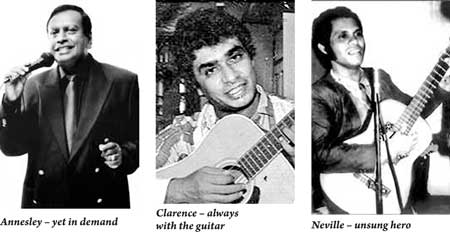Wednesday Feb 18, 2026
Wednesday Feb 18, 2026
Saturday, 6 January 2018 00:00 - - {{hitsCtrl.values.hits}}
 The young Josephian, having sat for the O/Level exam, left for home at Batugedera, Ratnapura to spend the school holidays.
The young Josephian, having sat for the O/Level exam, left for home at Batugedera, Ratnapura to spend the school holidays.
Although A/Level classes were not starting soon after the College reopened, he wants to come back to play tennis. As soon as he gets home his next-door neighbour comes over and tells him, a friend of his is on the lookout for a lead singer for a musical group he wants to form.
The next day both of them get on push cycles and go to see Wije, the young man with a box guitar waiting to find a singer. They then go to meet a company executive who is promoting Wije to start the musical group. No sooner he listened to the young man singing, he comments: “You got the voice.” He helps the young men to form the group.
This is the story that the ever-popular Annesley Malawana related about the birth of the Moonstones – the group formed by Clarence Wijewardena that became an instant hit. The person whom they met was Sangabo Corea, then a field executive of Lever Brothers.
The go-getter knew two other Coreas - Vernon and Vijaya – at Radio Ceylon and introduced the two young men to them. The two of them hurriedly wrapped the two guitars, got into a bus and came to Colombo. They got their break over the radio – the only broadcasting channel at the time.
The amiable Annesley recalled the start of his musical career 51 years ago, in ‘Ma novava mama’ – the popular musical programme over Derana TV presented by Kelum Srimal, veteran broadcaster. “The unexpected events ended my school career and tennis. Instead Clarence and I started on our musical careers,” he said.
Their success is well-known. The two of them formed a perfect duo. The amazing thing was neither of them had studied music. It was sheer inborn talent that helped to reach such great heights.
Annesley spoke about Clarence’s gift to write the lyrics and compose the music in addition to his singing skills. “He used simple words in writing a song. Often he picked living characters and real happenings as the theme of his songs. ‘Mango nanda’ is just one example. It was about a person we knew. Of course, he added a few extra characteristics to make it interesting.”
In the ‘Ma novena mama’ programme, the guest artiste has to pick seven songs of other musicians that he likes – not his own. He then has to discuss why he likes those songs. He also sings them.
Annesley started the evening with ‘Dilhani’ – the first song composed by Clarence and sung by Indrani, and went on to sing, among others, Chitral Somapala’s ‘Damubulu gale’, C.T. Fernando’s ‘Lo ada ninde’, and Los Flamincos’ ‘Kalu kelle’ (sung by Dulip de Silva).
The evening turned into an interesting chat about the early days of musical groups. Annesley remembered going to see a show at St. Peter’s College during his school days, by the then highly-popular Spitfires. Halfway through the show, another group was introduced. They were the Los Cabelleros.
 “That’s the first time we saw Neville Fernando who was soon to become a wonderful performer. Always with a smile on his face, we were soon to follow him and the group, which quickly became so popular. He was an unsung hero.” His untimely death removed a pioneer from the scene in a very short time.
“That’s the first time we saw Neville Fernando who was soon to become a wonderful performer. Always with a smile on his face, we were soon to follow him and the group, which quickly became so popular. He was an unsung hero.” His untimely death removed a pioneer from the scene in a very short time.
In the early years new groups like Moostones could not depend on shows to earn sufficient income to make a living. Annesley joined AT Cooray & Co as an accounts clerk and later Mayura Garments where he rose to become the general manager. Then he decided to open his own garment factory.
Towards the latter part of the 1980s Clarence invited him to continue in his group and a fresh start was made with the recording of the cassette ‘Rosa Male’. Meanwhile Clarence had moved out of Moonstones and formed the Golden Chimes. That too was disbanded until Gerald Wickremasooriya of Sooriya Records pushed him to form Super Golden Chimes. The group soon made the mark until Clarence passed away in December 1996, quite early in life. The young man who started his musical career when he was 21 departed at 53.
Annesley admitted that though he was not keen to continue after Clarence’s death, in response to so many requests he decided to keep the fans entertained with the good old numbers which have been favourites for over 50 years. He is much in demand both in Sri Lanka and abroad.